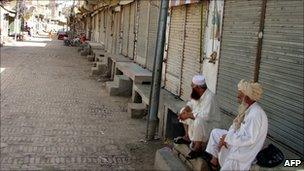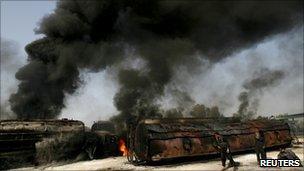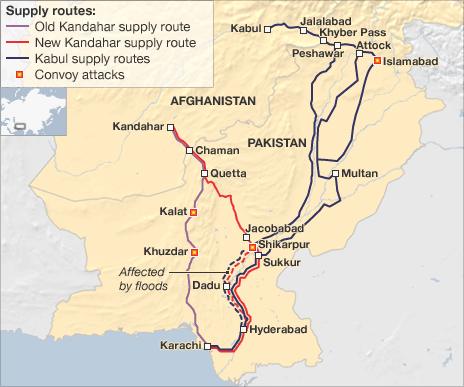Pakistan drone attacks kill nine suspected militants
- Published

Tribesmen in North Waziristan imposed a shutdown on Thursday in protest over drone attacks
At least nine militants have been killed in two drone attacks in Pakistan's north-western tribal area.
The attacks bring the total drone strikes to 25 in the past 29 days, part of an apparent crackdown on insurgents on the border.
At least 150 people, militants and civilians, have died in these strikes.
The latest attacks come amid a row between Nato and Pakistan after a cross-border strike killed three Pakistani troops.
In response to the heightened tension, Pakistan has stopped some Nato supplies crossing to Afghanistan.
The Pakistani troops died when helicopters strayed into Pakistani territory while chasing Taliban militants from Afghanistan.
Nato now says it regrets the incident, but emotions remain high in Pakistan. It has demanded a full-fledged apology and an end to Nato attacks into its territory.
Razed
In the first drone attack on Saturday morning, four missiles hit a house in Datta Khel village in North Wazaristan, killing eight militants, officials from Pakistan's intelligence service told AP news agency.
Eyewitnesses told the BBC that three missiles struck a house being used by Taliban militants. Local officials say the structure was completely demolished.
They say the militants took away the dead and injured soon after the strike.
Several hours later, the same house was struck by two missiles fired from a drone.

The Pakistani Taliban said they carried out Friday's attack on oil tankers in southern Pakistan
Local tribesmen say militants inspecting the site were killed in that attack.
Officials say all the dead fighters are part of local commander Hafiz Gul Bahadur's organisation.
He is a key Taliban commander, who has provided safe havens to al-Qaeda operatives in the region.
Local tribesmen have told the BBC the Datta Khel area has a large network of camps run by Arab and Uzbek al-Qaeda militants.
Drone attacks have increased recently, and some Western diplomats have suggested the rise is linked to terrorism plots targeting European cities.
The US does not generally confirm missile attacks by drones.
Waiting lorries
Some 150 trucks on Saturday were waiting for Pakistan to reopen the border crossing at Torkham, so they could deliver supplies to Nato troops in Afghanistan.
The closure of border crossings was a reaction to the killing of the three Pakistani border guards by the Nato helicopters.
Nato said the aircraft hit back after coming under small-arms fire from what they thought were insurgents, but Pakistan said its soldiers had fired shots to warn the helicopters that they had crossed into Pakistani airspace.
It was the third time in less than a week that Nato helicopters had pursued militants over the Pakistani border and fired on targets.
The Taliban in Pakistan have said they carried out Friday's attack on Nato oil tankers in the south of the country, saying it was retaliation for the three border troop deaths.
At least 27 tankers carrying fuel for Nato forces in Afghanistan were set alight in Pakistan's southern Sindh province.
Taliban spokesperson Azzam Tariq threatened more attacks unless all supply routes were closed.
"We ask the government of Pakistan to cut all the supply routes for Nato, otherwise we will continue targeting Nato's fuel trucks and containers," he told AP news agency.
The chairman of the US Joint Chiefs of Staff, Adm Mike Mullen, said the dispute with Pakistan had not affected operations and he hoped to resolve it soon.
